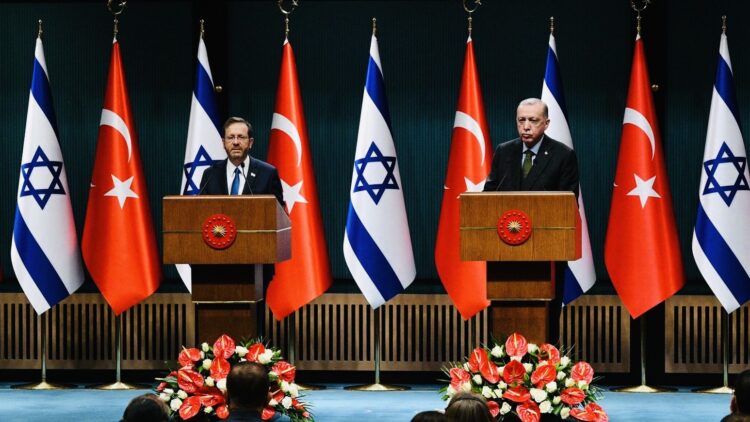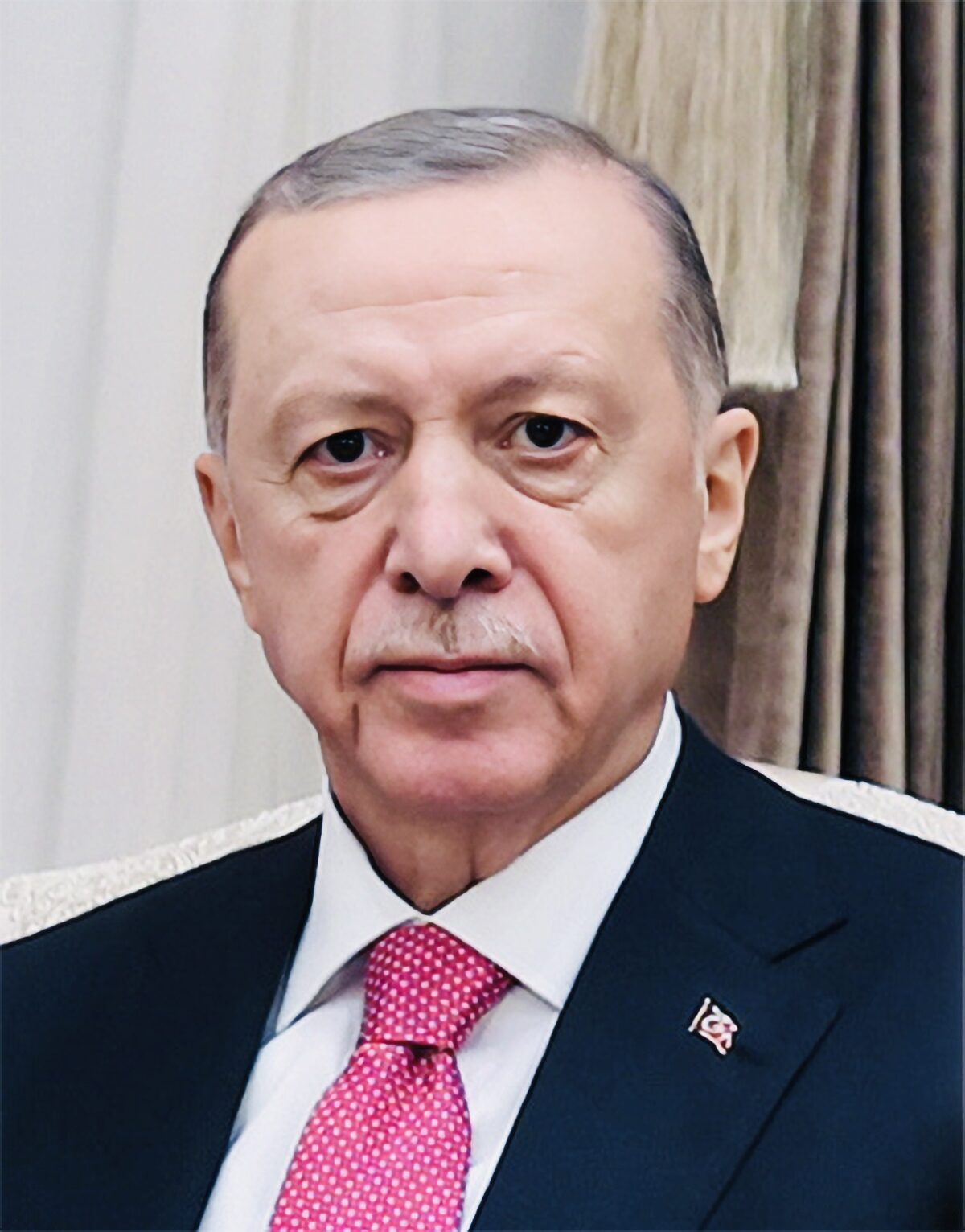Turkish President Recep Tayyip Erdogan’s pro-Palestinian proclivities have once again driven him to downgrade Turkey’s bilateral relations with Israel.
On May 2, the Turkish Ministry of Trade announced that “export and import transactions in relation to Israel have been stopped, covering all products.” Turkey said its trade suspension will remain in place until Israel allows “an uninterrupted and sufficient flow of humanitarian aid to Gaza.”
The following day, Turkey said the suspension will last until a “permanent ceasefire” ends the Israel-Hamas war in the Gaza Strip.
This is a major development because Turkey had never before tried to exert pressure on Israel by economic means, even in the worst of times.
Judging by the numbers, Erdogan’s move against Israel can best be described as a self-inflicted wound that will harm the Turkish economy, which already is in a lamentable state.
Israel, Turkey’s 13th biggest export market, received 2.1 percent of Turkish exports last year. Turkey was Israel’s fifth biggest source of imports last year.
The annual volume of trade last year was $6.8 billion, though a figure of $9 billion has been mentioned.
As expected, Israel deplored Turkey’s unilateral move, accusing Erdogan of violating free trade agreements signed from the mid-1990s onward.
Israeli Foreign Minister Israel Katz said, “Whoever takes unilateral steps against Israel’s economy with receive a painful and appropriate response. Israel’s economy is strong and Turkey’s economy will be harmed far more … Erdogan will come to regret this error.”
Erdogan’s latest move against Israel signifies that Turkey’s relationship with Israel is directly connected to and dependent on the simmering to boiling Palestinian question.
Turkey’s bilateral relations with Israel have been on edge for years now.
The first cross-border Gaza war in 2008/2009 exposed their sharp disagreements over the Palestinians.

The Mavi Marmara incident in 2010, during which Israeli commandos killed nine Turks aboard a Turkish vessel trying to circumvent Israel’s naval siege of the Gaza Strip, caused a near breakdown of diplomatic relations. Turkey, in a huff, recalled its ambassador in Tel Aviv, ordered Israel’s envoy in Ankara to leave, and downgraded relations with Israel across the board.
In 2016, Israel and Turkey, having resolved their differences after an Israeli apology and arduous negotiations, reestablished normal relations. But only two years later, Turkey recalled its ambassador in Israel again following a resurgence of Hamas inspired Palestinian violence along Israel’s Gaza border.

Relations were restored yet again in 2022 after Israeli President Isaac Herzog visited Ankara and conferred with Erdogan. Last September, in a tangible sign that they were fully on track, Erdogan met Israeli Prime Minister Benjamin Netanyahu in New York City and spoke of the possibility of a visit to Israel.
Hamas’ terrorist attack on Israel on October 7, resulting in the deaths of some 1,200 Israeli civilians, soldiers and foreign workers and the abduction of about 250 people, changed the dynamics of Israel’s ties with Turkey.
Shortly after October 7, Turkey and Israel recalled their respective ambassadors in Tel Aviv and Ankara. From that point onward, Erdogan displayed his true colors.
He did not condemn the atrocities. He called Hama a “liberation group.” He blasted Israel’s air and land offensive in Gaza. He denigrated Israel as a “terrorist state” and compared Netanyahu to Hitler. He attended a pro-Palestinian rally in Istanbul during which he wore a Palestinian scarf. He demanded an immediate ceasefire to stop the war.
Erdogan’s hostility toward Israel and his positive position toward the Palestinians were in keeping with his consistent support of Palestinian rights and of a two-state solution.
Despite his anti-Israel invective, Erdogan, an Islamist, came under domestic political pressure to announce concrete measures against Israel.
This past March, in local elections, his ruling AK party suffered its worst defeat in years, in part because some religious Turks voted for the Islamist New Welfare Party, which sought tough measures against Israel.
Erdogan was also offended by Israel’s refusal to allow Turkish airplanes to air-drop humanitarian supplies to Gaza.
Two months ago, in a reaction to these developments, Turkey imposed restrictions on 54 export products to Israel ranging from iron and steel to jet fuel, pesticides and construction equipment.
Interestingly enough, Erdogan’s suspended trade ties with Israel less than two weeks after meeting Ismail Haniyeh, a top Hamas official, in Istanbul. According to a Turkish presidency statement, Erdogan urged the Palestinians to unite for “victory.”
Katz condemned their meeting. “Erdogan, shame on you!” he wrote on X.
In retrospect, the Turkish government was prepared to go much further in antagonizing Israel, having given the so-called Freedom Flotilla Coalition permission to deliver humanitarian aid to Gaza.
Three ships linked with the Turkish Humanitarian Relief Foundation, the group that sponsored the ill-fated voyage of the Mavi Marmara, planned to challenge Israel’s blockade of Gaza by sending hundreds of tons of food, medical supplies, blankets and clothes to Palestinians there.
The flotilla’s plan was recently thwarted by Guinea-Bissau’s decision to remove its registry flags from the ships.
The Freedom Flotilla Coalition decried the removal as a “blatantly political move,” calling it a maneuver organized by Israel in conjunction with Guinea-Bissau.
The flotilla has been delayed several times, but now it has been postponed indefinitely. Turkey may attempt to resurrect it, knowing full well that Israel will try to slam the brakes on it. Alternatively, in the worst-case scenario, Erdogan could go all the way and sever relations with Israel altogether.
Colombia and Bolivia, both of which are governed by leftist presidents, have cut off ties with Israel. Will Turkey be the next country to do so?
